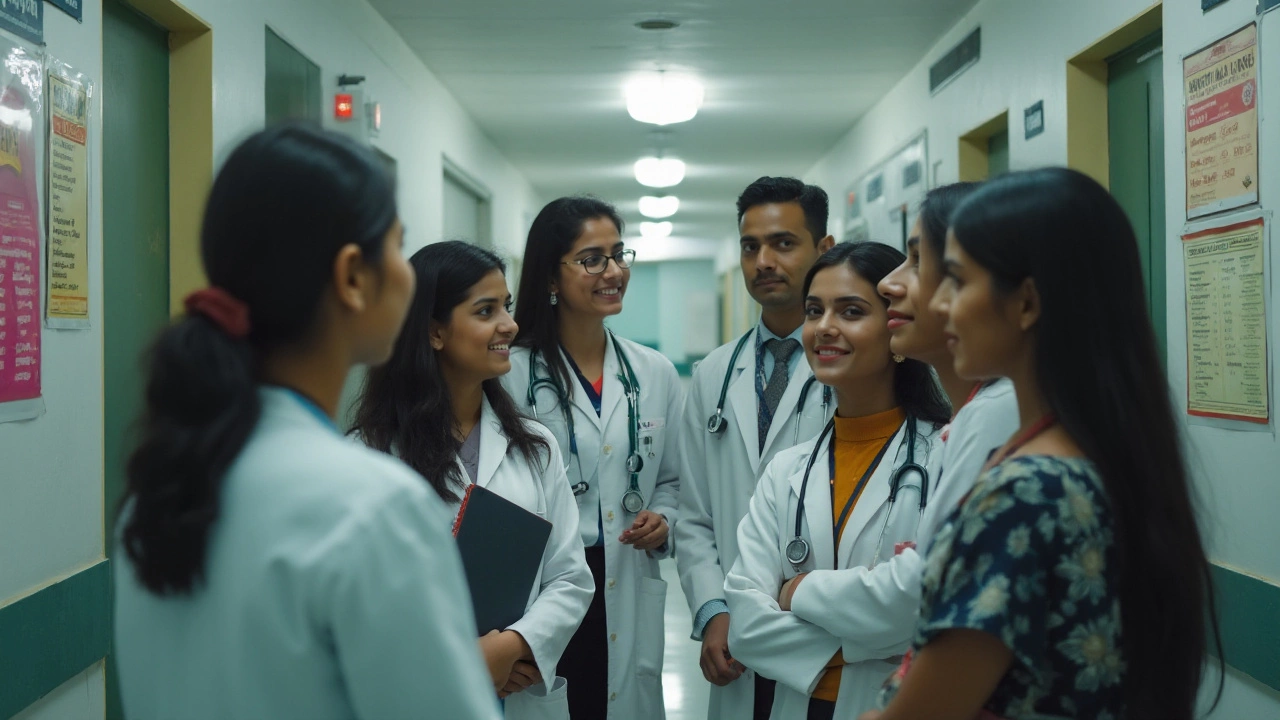The journey to becoming a doctor in India is as rewarding as it is demanding, particularly when it comes to understanding your potential earnings once you have that coveted MBBS degree in hand. With a changing economic landscape and evolving healthcare demands, pinpointing an exact salary might feel as complex as practicing medicine itself.
In this guide, we'll navigate the labyrinth of factors influencing MBBS doctor salaries in India, providing clarity on what newcomers and veterans alike can anticipate from their professional journey in 2024. From deciding between the public and private sectors to exploring how location and specialization influence earnings, this article sheds light on the financial realities and opportunities awaiting MBBS graduates today.
- Understanding the MBBS Pathway
- Public vs. Private Sector Salaries
- Impact of Location on Earnings
- Specialization and Its Financial Benefits
- Maximizing Your Potential Income
Understanding the MBBS Pathway
Embarking on the MBBS journey in India is akin to navigating a well-charted yet challenging course. An MBBS degree, or Bachelor of Medicine, Bachelor of Surgery, forms the foundation for a medical career and is one of the most sought-after degrees within India's competitive healthcare education landscape. The path often begins with clearing the National Eligibility cum Entrance Test (NEET), a pivotal gateway for aspiring doctors in India. NEET's grueling nature is underscored by the staggering number of candidates it attracts each year, with success rates making it imperative for students to exhibit both diligence and dedication.
To secure a coveted seat in one of India's prestigious medical colleges, students must undergo rigorous preparation. This involves not only in-depth learning of core science subjects like biology, chemistry, and physics but also cultivating analytical thinking and problem-solving skills. Once admission is secured, students embark on a five-and-a-half-year educational journey, which includes a year of compulsory rotating internship. The curriculum is intricate, combining extensive theoretical knowledge with practical application across various specialties such as pediatrics, surgery, and internal medicine. This diverse exposure not only arms them with essential medical skills but also allows them to discover specific areas of interest.
"Medicine is a science of uncertainty and an art of probability," noted Sir William Osler, underscoring the unpredictable nature of the medical profession even with substantial training.
The ultimate goal of the MBBS pathway is to mold students into well-rounded professionals who are equipped to tackle both the diagnostic and ethical dilemmas of healthcare. Students are assessed through periodic examinations and hands-on clinical evaluations that test their competencies comprehensively. Those who excel often attribute their success to an unwavering commitment to their studies, coupled with support from seasoned faculty members who highlight the real-world applications of textbook theory. As students progress, they often network with peers and mentors, which becomes invaluable when charting their careers post-graduation.
For MBBS graduates, the choice of specialization can significantly impact future career paths and even salary. Many choose to pursue further studies and specialization through postgraduate courses, elevating their expertise and expanding career prospects. The specialized skills gained during this period can lead to roles that not only promise higher remuneration but also allow doctors to create a niche for themselves within the medical community.
Choosing the MBBS pathway requires not only a passion for medicine but also an understanding of the arduous path ahead. Yet, for those committed to the demands, the rewards extend beyond financial prospects, offering a deeply fulfilling career dedicated to improving quality of life and advancing medical science. The journey from entering NEET coaching to completing a residency is more than just a transformative professional leap; it's a commitment to lifelong learning and compassion.
Public vs. Private Sector Salaries
One of the fundamental decisions that newly minted MBBS doctors in India face is choosing between employment in the public sector and venturing into the private sector. This choice influences not only the type of work environment they will experience but also their potential earnings. The public sector, often associated with government hospitals and clinics, offers a structured path with defined pay scales and benefits. The salaries here, though typically lower than the private sector, come with job security, pension plans, and standardized working hours, which can appeal to many.
In the public sector, an MBBS doctor's salary can range anywhere from INR 6 to 12 lakhs annually, depending on factors such as seniority, specialization, and the state of employment. One significant advantage of this sector is the added non-monetary benefits that bolster the appeal, like housing allowances and subsidized education for children, which are part of a comprehensive benefits package. Additionally, doctors can enjoy regular promotions and pay hikes based on experience and service tenure, offering a sense of stability and predictable growth.
The private sector, on the other hand, often promises higher immediate earnings with greater variability. Here, MBBS graduates might find themselves in high-demand environments, such as corporate hospitals or private clinics, sometimes earning upwards of INR 15 to 20 lakhs annually. The earnings can fluctuate based on factors like specialization, the reputation of the hiring institution, and the region. Notably, cities like Delhi and Mumbai tend to offer higher salaries compared to others due to their higher cost of living and demand for healthcare services.
The prospect of substantial financial rewards in private practices can indeed be alluring. However, it is crucial to consider the often demanding work schedules, performance-based incentives, and, in some setups, a lack of long-term job security. For those willing to marry entrepreneurial spirit with medical expertise, starting a private practice is another avenue. Such initiative presents boundless earning potential though it comes with business risks and regulatory challenges.
According to Dr. Arvind Kumar, a healthcare economist, "Choosing between these sectors is not just about the immediate paycheck. It is about aligning career goals with personal values and long-term satisfaction."
Comparison Table: Public vs. Private Sector Salaries
| Aspect | Public Sector | Private Sector |
|---|---|---|
| Annual Salary Range | INR 6 - 12 lakhs | INR 15 - 20 lakhs |
| Job Security | High | Variable |
| Benefits | Comprehensive | Performance-based |
| Work Hours | Regular | Long/Variable |
In essence, the choice between public and private sectors for an MBBS doctor in India is nuanced and deeply personal. Understanding one’s career aspirations, financial goals, and lifestyle preferences is key to making an informed decision. Each path offers unique benefits and challenges, urging aspiring doctors to weigh their options thoughtfully.

Impact of Location on Earnings
Where an MBBS doctor chooses to practice in India can significantly influence their earnings. The economic disparity among different regions, be it between states or urban-rural settings, plays a crucial role here. Metropolitan areas like Mumbai, Delhi, and Bangalore typically offer higher salaries to medical professionals than smaller cities and rural locations. This generally stems from the higher demand for healthcare services in these bustling hubs and the associated higher cost of living. However, those working in the countryside might enjoy various subsidies and incentives as the government attempts to provide equitable healthcare across the nation. Working in well-equipped hospitals in urban areas not only promises better immediate financial rewards but also creates opportunities for networking and career advancements that translate into long-term gains.
Despite the allure of urban environments, challenges like urban congestion, pollution, and higher stress levels should be considered. Rural postings, often perceived as less lucrative, can come with significant advantages, including lower living costs and sometimes, student loan forgiveness programs or additional incentives offered by state health departments. These factors make such opportunities attractive for fresh graduates who are keen to serve in community health sectors and simultaneously benefit financially. Location impacts earning potential and job satisfaction substantially, shaping a doctor's career path both monetarily and experientially.
The difference in medical salaries is stark; as Dr. Arvind Kumar from AIIMS remarked, "While salaries may tempt young doctors to urban centers, the real gratification sometimes is felt greater in rural sectors where every day brings new, tangible impacts."
In many states, state governments have begun to step up offerings for rural postings that could rival or even surpass urban salary structures when all benefits are tallied. Another factor influencing salary is medical tourism, which is booming in cities like Chennai and Manipal, known for offering specialized care at competitive prices internationally. This influx of medical tourists often demands high proficiency and prepares professionals for a global healthcare setting, thereby pushing remuneration packages up.
Urban vs. Rural Financial Dynamics
Statistics reflect that while a general practitioner in a tier-1 city could earn an average of INR 80,000 to 1.5 lakhs monthly, the same professional in a rural setting might start at INR 40,000 to 75,000 but with significant growth over time due to policy-driven incentives.
| Location | Starting Salary (INR) | Potential with Incentives (INR) |
|---|---|---|
| Urban | 80,000 - 1.5 lakhs | 1.5 - 2 lakhs |
| Rural | 40,000 - 75,000 | 1 - 1.5 lakhs |
Thus, it’s evident that while on the surface MBBS doctor salary may vary drastically based on location alone, long-term benefits could equalize these differences as professionals navigate through their careers. Weighing these factors, along with personal goals and lifestyle preferences, can aid aspiring doctors in choosing the most suitable path.
Specialization and Its Financial Benefits
Pursuing a specialty in the medical field offers significant financial benefits for an MBBS doctor in India. The decision to specialize is not merely about the pursuit of a passion for a particular area of medicine; it can also significantly influence earning potential. Specialists, such as cardiologists, neurologists, and surgeons, tend to command much higher salaries compared to general practitioners. This is primarily due to the advanced expertise and skill required in these fields, as well as the critical nature of the conditions they treat, which often demand urgent and sophisticated intervention.
The path to becoming a specialist involves additional years of study and training, often requiring MD/MS or DNB degrees, coupled with rigorous practical experience. While the initial investment of time and resources may seem daunting, the payoff can be substantial. For instance, a cardiologist in a private hospital can expect to earn between INR 1.5 to 2 crores annually in metropolitan regions, significantly more than what a general physician might earn.
While discussing specializations, it is important to consider the demand-and-supply dynamics prevalent in the healthcare sector. According to a study by the National Health Profile, there is an increasing requirement for medical specialists in urban areas due to lifestyle diseases, but rural areas see a deficit in general practitioners.
Dr. Randeep Guleria, a renowned physician, noted, "As specialization increases, so does the expectation of skill set, demanding continuous learning and adaptation to new treatments and technologies."
Choosing a specialization also opens up diversified career avenues including academia and research, predominantly in reputed institutions where doctors can explore academic positions that offer both financial stability and prestige. Additionally, specialization can pave the way to international practice, where MBBS doctors might find options to work in more lucrative environments abroad.
Thus, while the initial decision to specialize requires a commitment of time and energy, the eventual financial and professional rewards can make it a compelling choice for those passionate about a particular branch of medicine. Considering the rapid advancements in healthcare, continuous learning and professional development will not only benefit their career growth but also enhance the quality of care provided, aligning with the evolving healthcare needs in India.

Maximizing Your Potential Income
Charting a course to elevate your earnings as a MBBS doctor involves more than simply passing exams and acquiring a degree. To truly make the most out of your medical career in India, it’s essential to think strategically about where you’re headed and the opportunities that lie along the way. For starters, consider diversifying your skill set. In an era where interdisciplinary knowledge is increasingly valued, doctors adept in other areas such as management, technology, or administration can often find more lucrative roles. The integration of IT in healthcare, for instance, has opened doors for doctors who understand health informatics and digital health tools.
Networking within the medical community can't be overstated when it comes to boosting your professional journey. Building a strong professional network can lead to opportunities you might not find otherwise. Cultivate relationships with mentors, attend conferences, and join medical associations. These connections can lead to doors you never knew existed, providing insights and leads related to higher-paying jobs, collaborations, or research opportunities. A quote from the famous medical economist Marion T. Cohen states,
"In medicine, your network is your net worth."Joining hands with peers and seniors who have traversed the path you aim to walk can bring a wealth of knowledge and opportunity.
Another key to maximizing income is choosing the right specialty. Various specializations in the medical field can offer significantly different income levels, with high demand for fields like surgery, radiology, or anesthesiology typically commanding higher salaries. Consider, for example, how urban specialists in cardiology or neurology could see different income levels compared to general practitioners in rural settings. Even in the vast public sector, strategic specialization can lead to faster promotions and associated financial benefits. Let’s not forget, continuous education bolsters reputability and confidence in surgery rooms and consultation halls.
The geographical aspect should not be overlooked either. When you choose where to practice, keep in mind that metro cities often provide higher salary packages due to the cost of living and demand for specialties. However, smaller towns and cities might offer fewer counterparts vying for the same jobs, potentially leading to faster career advancement. According to ICICI Bank’s 2023 report, professionals in urban centers can earn approximately 20-30% more than their rural counterparts owing to the concentrated healthcare demand and resource allocation.
Lastly, don’t underestimate the power of branding and communication skills. Doctors are service providers, and like any service industry, reputation and patient rapport can make a significant difference in your practice's success and, consequently, your income. Strong patient relationships often lead to higher patient retention and referrals, which inherently boosts your practice. Enrolling in leadership and communication skills workshops can enhance these capabilities, giving you an edge in personal practices or administrative roles.






Write a comment: